LSU Exorcises Its Past to Cap a Program Reawakening With a Historic Title

NEW ORLEANS — They were running. They weren’t sure where and why, but they were running, this time in celebration, scattered across the Superdome field in a celebratory rat race of a stunning championship, LSU players pouring from their sideline as if they were purple-and-gold confetti shot out of a cannon.
In a way, they’ve been running for a while now, both the people of Louisiana and those within the LSU football program. They’ve been running from their problems and their past, running from a once archaic, inept offense, running from a near-decade long skid to rival Alabama, running from the embarrassment of a 21-0 loss the last time they were here, the 2011 national championship game. Their people have been running for quite a while, in fact, from the state’s financial woes and infrastructure issues.
MORE: LSU Captures Fourth National Championship
Some of them have good reason to run. Their leader, Ed Orgeron, flopped in his only opportunity as a full-time head coach just 12 years ago. Their quarterback, Joe Burrow, was unwanted at his dream school, Nebraska, and unused at his previous school, Ohio State. Their leading running back, Clyde Edwards-Helaire, is listed at 5 foot 8 inches and might be shorter. Their top receiver, Justin Jefferson, was a lightly recruited prospect who qualified academically at the very last minute.
They’ve been running from things decades ago and things only months old. “We lost to f------ Troy two years ago,” says one LSU assistant. “I was there.” They’ve been running and running, from their reputation as big, dumb bayou people, from their critics and their foes.
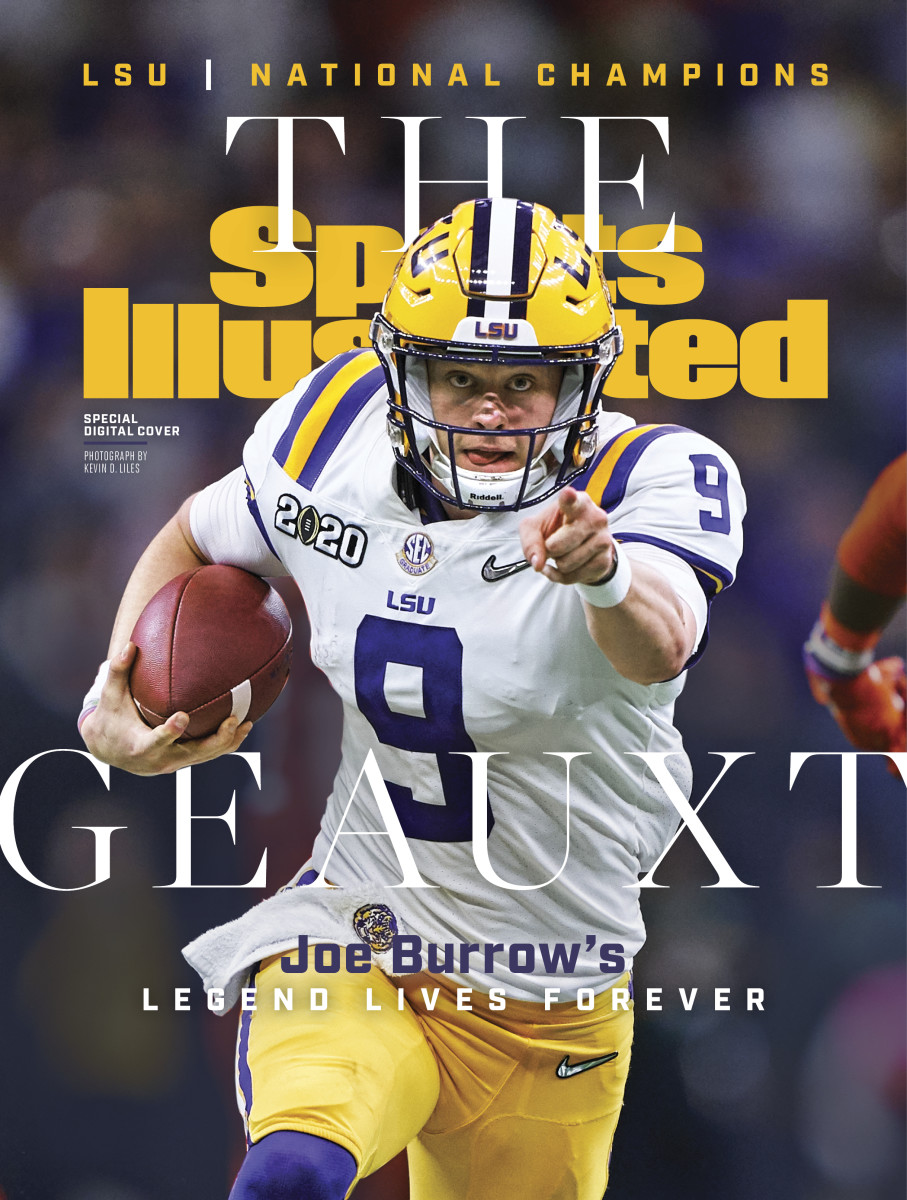
On a late Monday night in New Orleans, they were running again, this time for all the right reasons—that gold championship trophy, those diamond rings, a historical accomplishment of epic proportions. LSU ran right into college football lore in this place, drubbing Clemson 42-25 to win the fourth national championship in school history and the third in the last 17 years, a golden era in Baton Rouge that featured three different coaches leading the Tigers to a title: Nick Saban (2003), Les Miles (2007) and Orgeron (2019).
This might be the best of them all. In fact, the 2019 LSU football team might be the best ever, at least offensively, that college football’s ever seen. They became just the second team to reach 15-0 since Division I split in 1978 and beat more top-10 squads (seven) than any team in the sport’s history. On Monday night against Clemson (14-1), they broke the FBS single-season record for points, ending with 726 to surpass the 2013 Florida State team. This one wasn’t as easy as some others have been this year. They fell behind 17-7 in the second quarter before needing their Heisman Trophy-winning quarterback to carve through yet another defensive secondary, making sensational plays and passing with baffling accuracy on one of the country’s toughest defenses. During one second-quarter stretch, Burrow completed six of eight attempts for 149 yards, a clip of nearly 25 yards a completion.
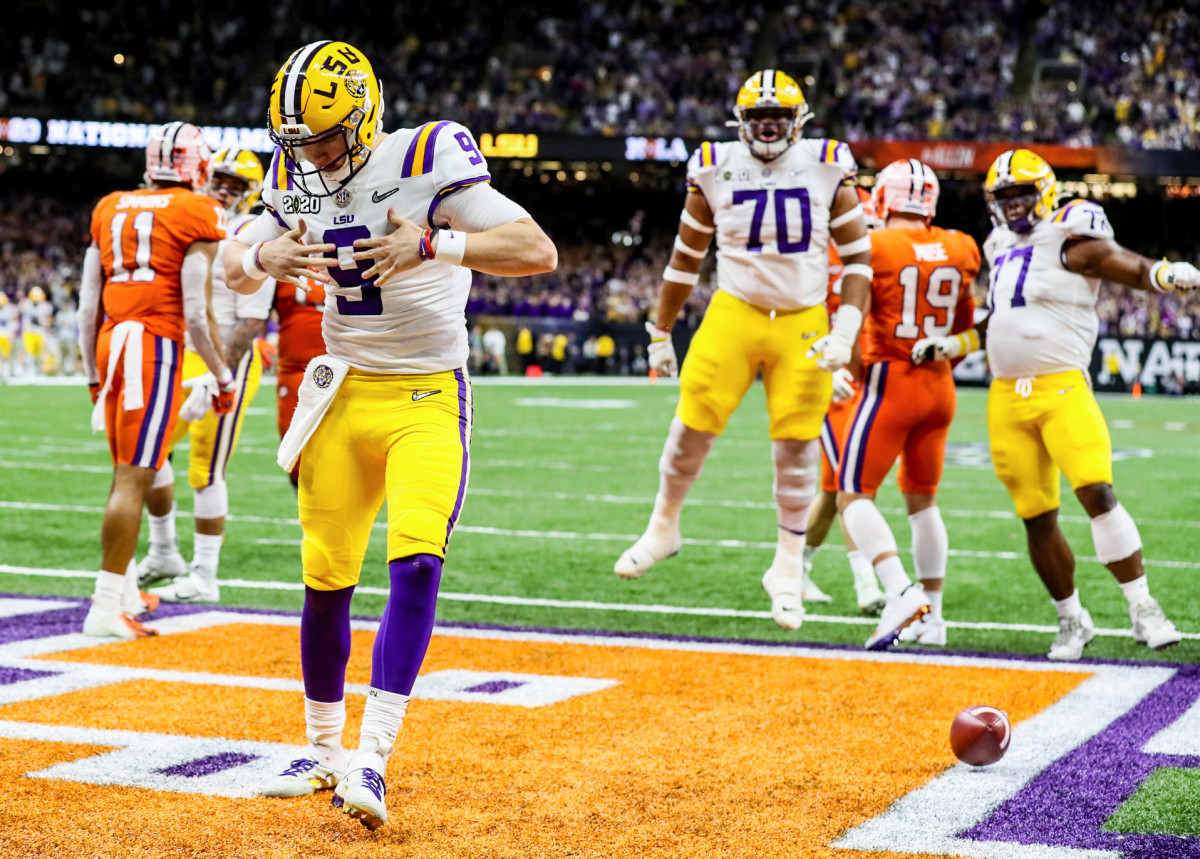
And then he ran, just like they all did. They ran to smoke cigars in a dingy locker room, so heavy was the smoke that a uniformed officer threatened arrests. They ran to wave massive LSU flags, to high-five fans, to create confetti angels on a Dome turf carpeted in purple-and-gold. They celebrated with some of the school’s most noteworthy players. They were running, too. One of them, Odell Beckham, Jr., ran across the field, hopped onto an ESPN stage during a live broadcast and barked some words into a hot mic. Later, he shuffled through a smoke-filled locker room yelling toward media members, “Ohio State’s not here!”
In a way, this was a snapshot epitomizing this team, not bashful but boastful, not boring but brash. Their media sessions often produced quotes trashing the opponent. Normally frowned upon as bulletin-board material to be used against them as motivation, this group did not care. They bubbled with confidence and backed it up on the field. They won their three postseason games by a combined 79 points, blowing out some of the nation’s best teams with a sticky defense and a silly offense, the finale unfolding at a familiar place.
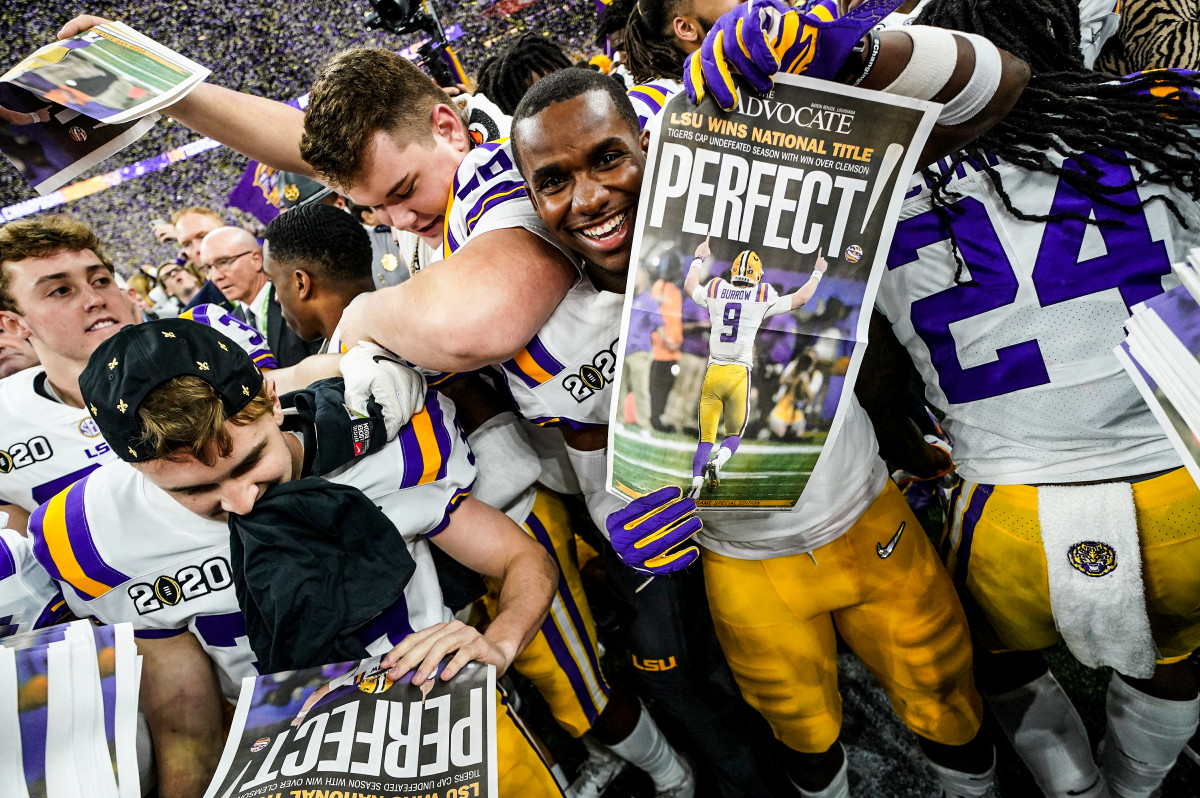
On this same field eight years ago, Alabama shut out LSU in a 21-0 debacle that many in Baton Rouge still claim was the beginning of the end of a purple-and-gold dynasty. That game lurches over the program like a dark cloud, the sick memory of a surefire championship season gone so wrong. “The demons have been f------ executed,” says T-Bob Hebert, a radio host in Baton Rouge who played center on that 2011 LSU team. “I think I chewed off the arms and legs of a king cake baby during the game I was so nervous. I’m talking about I was carrying around more pain and bull s--- from 2011 than I had even thought.”
Jefferson, LSU’s top senior wideout, watched the 2011 game from the Superdome stands as an 11-year-old, his brother Jordan on the field struggling as LSU’s quarterback. He’s the last in a line of three Jefferson brothers to play for the Tigers. “My family,” he said, “none of us had won a championship in college. To bring them this, it’s special.”
This dynasty seems very much alive again, rising from the ashes like their coach, publicly beaten and battered but fighting to the summit of this sport, a former bar-brawler Cajun man, fired at Ole Miss and snubbed at USC, leading this program to a championship 50 miles north of his bayou hometown. “It’s unbelievable,” says Cody Orgeron, Ed Orgeron’s son, who puffed on a cigar in the happy locker room. “God’s story. No man can write this besides God. So proud of my dad. He’s the man on the top of the mountain now.” One fan in the front row Monday night held a sign featuring Orgeron’s infamous quote from two years ago—“We comin'”—with a line crossed through it. Below, it offered two more words: “We here.”
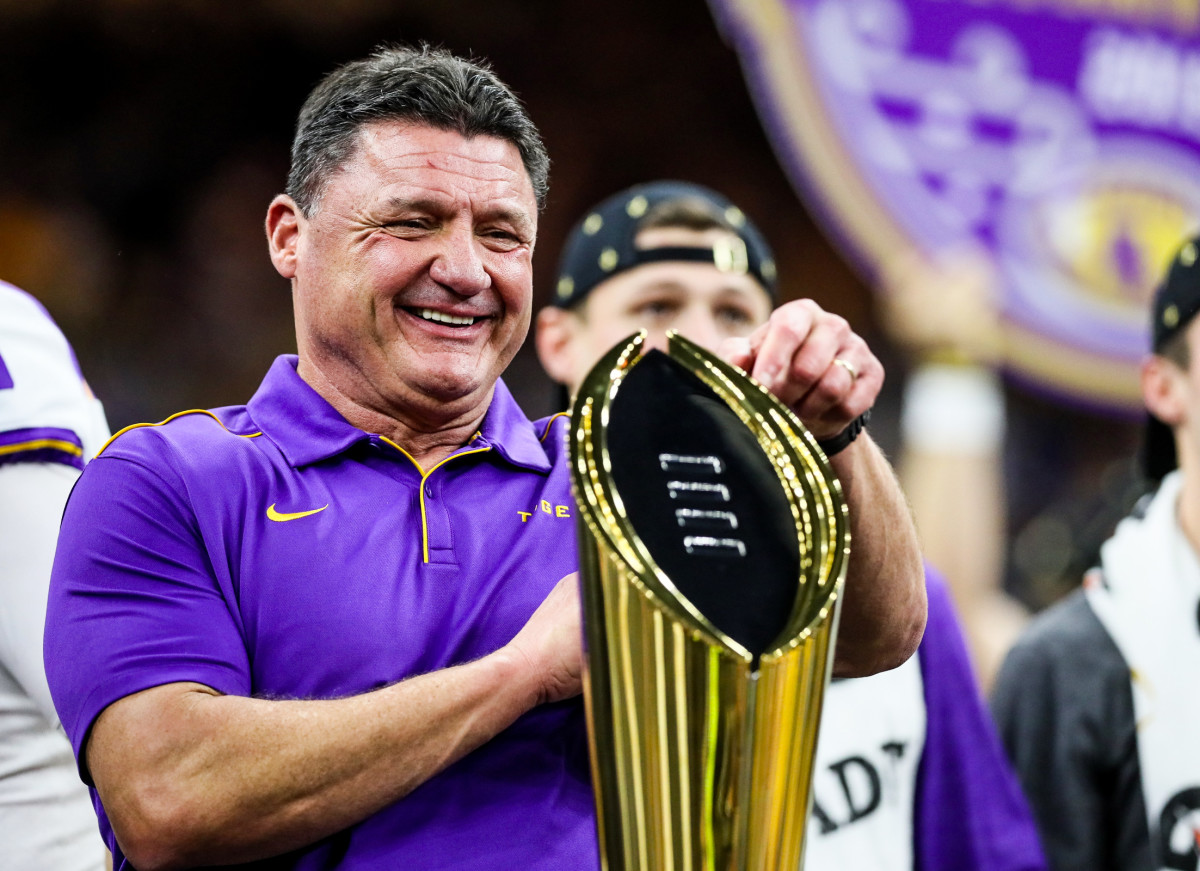
And maybe they’re not even done just yet. “Hang on,” says Paul Boudreaux, a 65-year-old south Louisiana native who’s been close to the LSU program for years, “we comin‘ again.”
Finally, they’ve made it, like they all expected. Tommy Moffitt, the program’s longtime strength coach, realized it during the first day of offseason drills last January. He saw a team with strong character and a hard-driving work ethic. “I knew we were going to do it from Day 1. I told everybody this team is special,” he says during an interview amid the on-field celebration. “You just get a feeling.” Over the weekend in New Orleans, the team’s hotel hugging the booze-fueled French Quarter, not a single player missed curfew, Moffitt says, a sign of their focus. Cody Orgeron asked his dad throughout the week about his feeling heading into this bout. He kept telling him the same two words: We’re ready. We’re ready. We’re ready.
It’s been that way all season, crossing each high hurdle, one after the other: a September road trip to Texas, October home games against top-10 squads Florida and Auburn, a skid-ending win at Alabama and rollicking postseason victories over Georgia, Oklahoma and now Clemson. Best team ever? Well, of course, they say. “I think we’re the greatest of all time,” says receiver Terrace Marshall. “It’s unbelievable.”
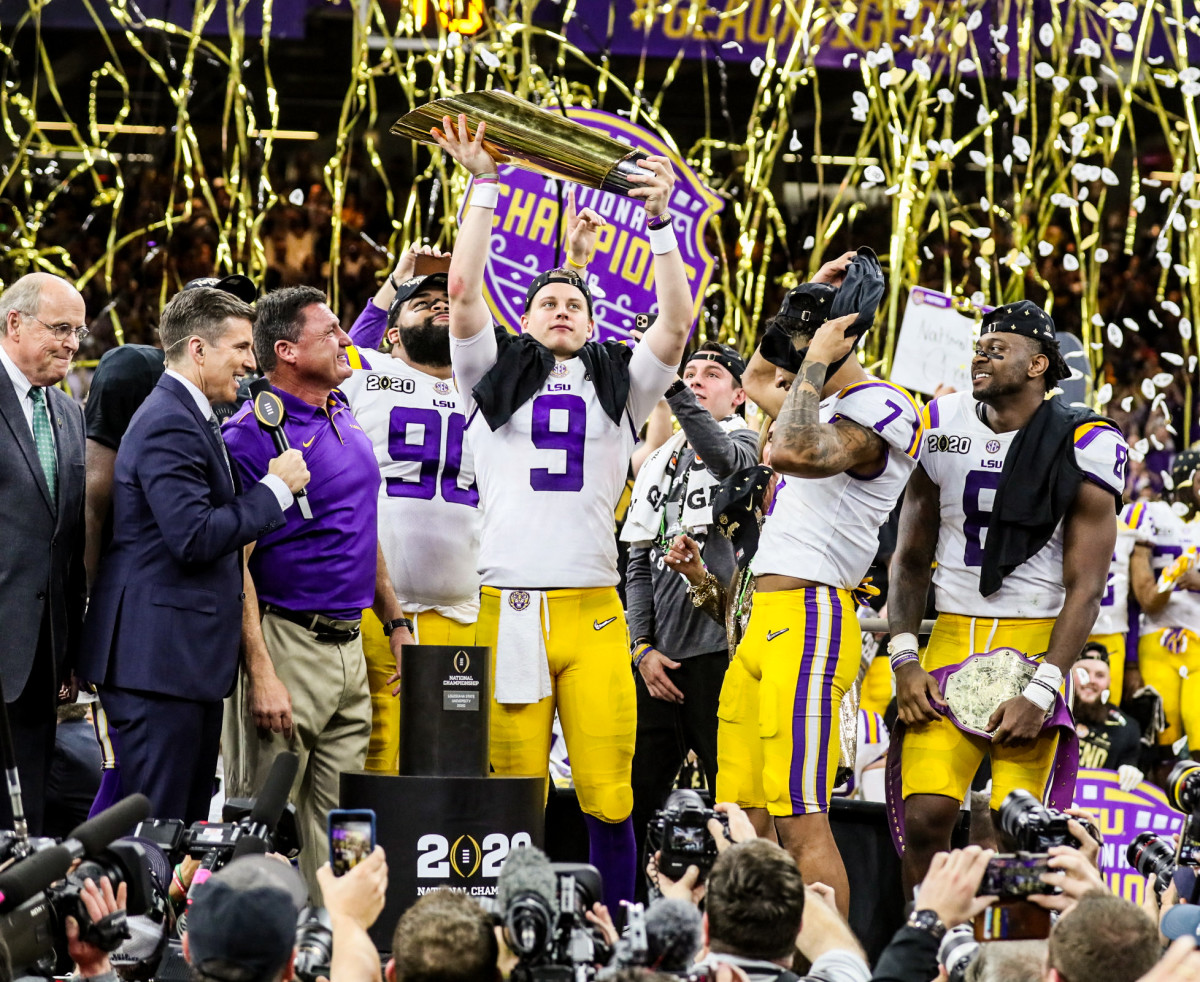
For defensive lineman Rashard Lawrence, the start of LSU’s magical run came during fall camp, when a scrum broke out between Burrow and defensive players. Ticked off at cheap shots against him, Burrow picked a fight with defenders and then later shredded through them operating from LSU’s new spread scheme. “They tore us up,” Lawrence said. “He put up 400 on us in a scrimmage. We hit him and we weren’t supposed to. He wasn’t happy at all.” A significant storyline for much of the season, LSU overhauled its offense during the offseason, switching from a traditional scheme to a spread attack, implemented by 30-year-old pass game coordinator Joe Brady.
It was Burrow, though, that made this unit go. He showed more grit and toughness on Monday, buried hard against the turf during a 6-yard touchdown pass to tight end Thaddeus Moss, rising slowly from the field and holding his midsection as he pushed away trainers on the sideline. His most incredible play came with LSU nursing a three-point lead in the third quarter. Against a jailbreak blitz, he pushed a pass off to receiver Ja’Marr Chase, a 43-yard completion that eventually resulted in a 35-25 lead. The more you bash and beat Burrow, the more he thrives against you. And those hard-ass hits? “Well,” says equipment manager Eric Cookmeyer, “he’s a hard-ass dude.”
Deep into the night they celebrated here, well into the wee hours of Tuesday morning, purple-and-gold flooding this fine city. There’s an old saying in Louisiana. It’s a drinking state with a football problem. Or it’s a football state with a drinking problem. It is clear on this night which is accurate. In fact, an LSU staff member on Monday night was asked of his plans later. “I’m diving into that whiskey, son,” he answered. This party will rage for weeks if not months. LSU officials are tentatively planning a championship parade on Saturday in Baton Rouge, just days before the annual Mardi Gras carnival season arrives.
Meanwhile, as Monday turned to Tuesday in the Superdome, Ed Orgeron, not running at all, slowly walked off a field carpeted with purple-and-gold confetti. There’s no more running. There’s no need to run. They’ve made it.
More LSU-Clemson Coverage:
Litman: Ja’Marr Chase’s Domination Gives LSU the Spark It Needed
Forde: Rare Taste of Defeat Will Fuel Clemson Well Into 2020
Rosenberg: Joe Burrow Aces Final Test of Historic Season
LSU Maven: LSU Captures Fourth National Championship
